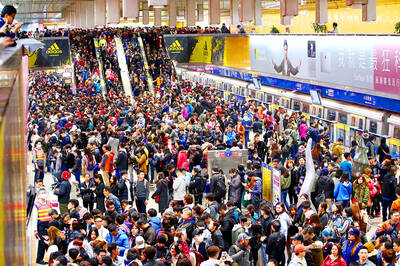Chinese Nationalist Party (KMT) Taipei City Councilor William Hsu (徐弘庭) has threatened to take legal action against netizens who posted vitriolic replies on Facebook after he made what was deemed to be a disrespectful remark about Taipei Mayor Ko Wen-je (柯文哲).
During Wednesday’s meeting of the Taipei City Council, Hsu said that Ko’s apparent “protection” of former EasyCard Corp chairman Tai Chi-chuan (戴季全) over the issuance of controversial card sets implied that the two men had a “special/sexual” relationship (特殊性關係), prompting a visibly angry Ko to slam his fist on his desk.
His Facebook page has been under siege, with more than 400 abusive messages about his postings on Ko’s handling of the “porn star” EasyCard sets, Hsu said.
Hsu on Thursday said that he would give anyone who had posted an abusive message until Friday to remove the comments or he would sue “every last one of them.”
People First Party legislative candidate Liu Wen-hsiung (劉文雄) took to Facebook to ridicule Hsu.
“Damn it. Don’t you know that I will make you pay dearly for pissing me off? How dare you pound the desk at me? Do you want to see your budgets blocked? Apologize now,” Liu wrote.
Refering to Hsu’s former superior, KMT Central Standing Committee member and former EasyCard chairman Sean Lien (連勝文), Liu wrote: “Those fastidious netizens… Don’t you know that my boss is a ‘prince’? ... How dare you trash my Facebook page and spoil my mood chatting with my female friends. I’ll sue your pants off,” Liu wrote.
Liu’s post drew a quick response from Hsu.
“As a senior politician and a media personality, you have gone too far for the [legislative] elections as to make this futile attempt to read my mind. I didn’t know you could stoop so low,” Hsu wrote.

People can take the Taipei MRT free of charge if they access it at Nanjing Sanmin Station or Taipei Arena Station on the Green Line between 12am and 6am on Jan. 1, the Taipei Department of Transportation said on Friday, outlining its plans to ease crowding during New Year’s events in the capital. More than 200,000 people are expected to attend New Year’s Eve events in Taipei, with singer A-mei (張惠妹) performing at the Taipei Dome and the city government’s New Year’s Eve party at Taipei City Hall Plaza, the department said. As people have tended to use the MRT’s Blue or

Civil society groups yesterday protested outside the Legislative Yuan, decrying Chinese Nationalist Party (KMT) efforts to pass three major bills that they said would seriously harm Taiwan’s democracy, and called to oust KMT caucus whip Fu Kun-chi (傅?萁). It was the second night of the three-day “Bluebird wintertime action” protests in Taipei, with organizers announcing that 8,000 people attended. Organized by Taiwan Citizen Front, the Economic Democracy Union (EDU) and a coalition of civil groups, about 6,000 people began a demonstration in front of KMT party headquarters in Taipei on Wednesday, organizers said. For the third day, the organizers asked people to assemble

Taipei is participating in Osaka’s Festival of Lights this year, with a 3m-tall bubble tea light installation symbolizing Taiwan’s bubble tea culture. The installation is designed as a bubble tea cup and features illustrations of Taipei’s iconic landmarks, such as Taipei 101, the Red House and North Gate, as well as soup dumplings and the matchmaking deity the Old Man Under the Moon (月下老人), affectionately known as Yue Lao (月老). Taipei and Osaka have collaborated closely on tourism and culture since Taipei first participated in the festival in 2018, the Taipei City Department of Information and Tourism said. In February, Osaka represented

Taiwanese professional baseball should update sports stadiums and boost engagement to enhance fans’ experience, Chinese Professional Baseball League (CPBL) commissioner Tsai Chi-chang (蔡其昌) told the Liberty Times (sister paper of the Taipei Times) in an interview on Friday. The league has urged Farglory Group and the Taipei City Government to improve the Taipei Dome’s outdated equipment, including relatively rudimentary television and sound systems, and poor technology, he said. The Tokyo Dome has markedly better television and sound systems, despite being 30 years old, because its managers continually upgraded its equipment, Tsai said. In contrast, the Taipei Dome lacked even a room for referees